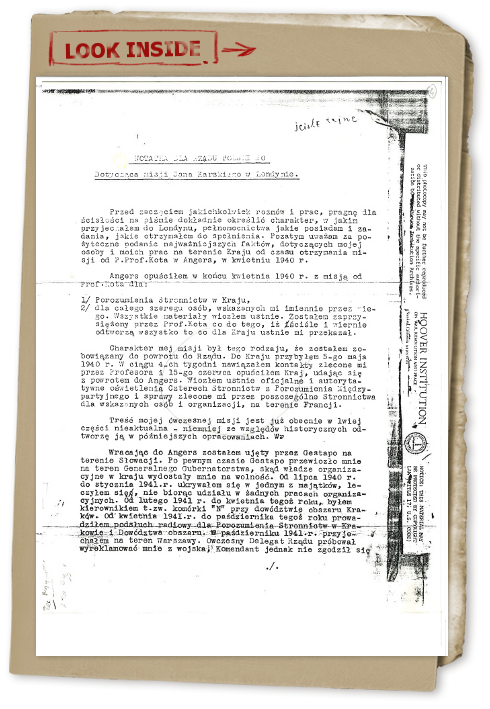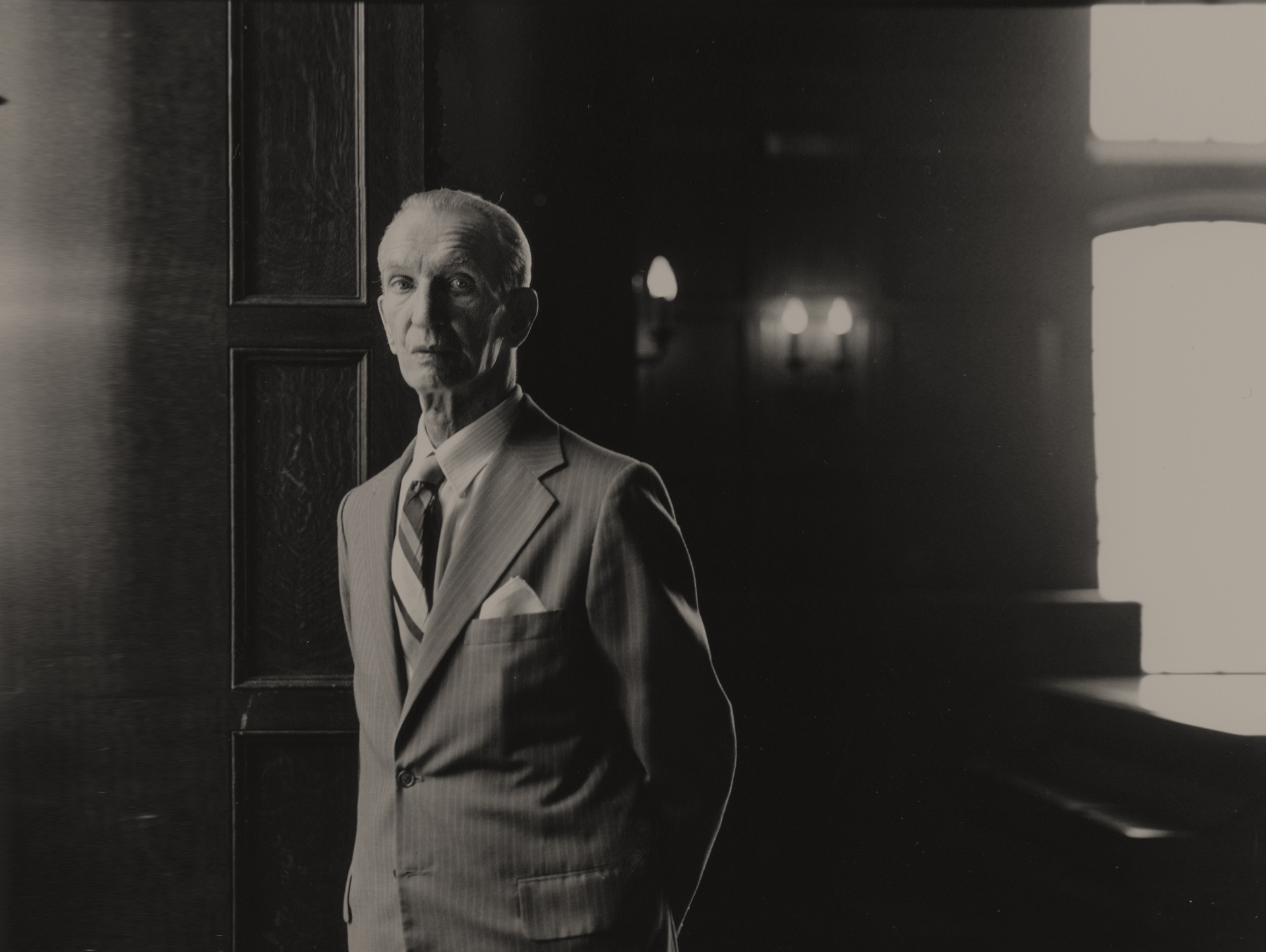| Author's Trip
| The Overall Situation in the Country
| Jewish Questions at Home
| A Brief for the Polish Government
| Sustaining the Spirit of Combat in Polish Society
| An Account of Karski’s Conversation with President Roosevelt

A Brief for the Polish Government (Jan Karski's Mission in London)
Before I begin any conversations or work, I would like, for clarity's sake, to declare in writing what is the nature of my trip to London, what are the orders I had received. Moreover, I consider it useful to give the most important facts about myself and my work in the country since I first received mission orders from Professor Kot in Angers, in April of 1940.
I left Angers toward the end of April of 1940, with instructions from Professor Kot, to:
- Form the Political Consultative Committee
- Contact a number of people. I was given the materials only in verbal form, and I was sworn by Professor Kot to faithfully and accurately relay everything he told me back in Poland.
My mission's nature was such that I was obliged to go back to the government-in-exile. I arrived in Poland on May 5, 1940. Within four weeks I got in touch with the people as directed by the Professor; and on June 15 I left the country, going back to Angers. I took the official and authoritative statements of the four parties from the Political Consultative Committee and the assignments from the different parties for the people and organizations indicated in France.
The contents of my mission at the time are now mostly outdated – but for historical reasons I will recreate them in later works.
On my way back to Angers, I was captured by the Gestapo on Slovakian territory. After a while, the Gestapo transported me to the General Government, where the Polish Underground leadership rescued me. From July of 1940 to January of 1941 I was hiding in one of our estates, recuperating, not taking part in any of the Underground organizational efforts. From February of 1941 to April of that same year, I was the head of the “N” organizational cell by the Krakow district leadership. From April to October of 1941, I organized radio wiretapping for the Political Consultative Committee in Krakow and for the district's leadership. In October of 1941, I arrived in Warsaw. The Government Delegate at the time tried to get me out from the army, but the Commander did not agree.
I became the head of the political information department by the Main Command, while also receiving an assignment to liaise with the Government Delegation and to inform it, if necessary, about the situation of Underground life in Poland. My third assignment was to serve as a liaison between the Main Command and the different political centers in the country. This communication was formal, but not official. Independently, the Government Delegation and the Department of Internal Affairs would give me assignments of contacting, in the name of the Government Delegation, individual smaller political groups, which were not part of the Political Consultative Committee.
I worked like this up until October of 1942. My department would deliver raw information to the Main Command and the Government Delegation.
In September of 1942, it became crucial for the Government, the Delegation and the Main Command to communicate about political matters. Due to the nature of my work, I had gathered the most extensive material in the country about the entirety of the political Underground movement, the Delegation offered me a mission to London. I agreed. [...]
The cost of my trip 37,000 zl [...]
The nature of my mission - agreed by the Government Delegate and the Political Consultative Committee - was as follows:
- I am delivering two kinds of materials: written ones, officially assigned by the delegation, the four parties or the Main Command, and verbal ones to be delivered to indicated organizations and people in London. [...]
- I am responsible for bringing written materials to the government and political explanatory statements from the Delegate and his five most important department heads: Internal Affairs, Propaganda, Reconstruction, Education and Social Service as well as the Bureau Chief. I talked with all of these gentlemen before I left.
- I am bringing authoritative statements for the Commander-in-Chief's government, regarding all the political affairs in the country.
- Aside from the authoritative statements about the political situation given to me by the four parties to relate to the government, I also received, under oath, a number of secret explanatory statements from each of the parties for specific individuals and groups in London.
- I also have information from many unaffiliated high-ranking Underground officials and important activists. The Delegate is aware of all of these conversations. I am attaching a list of these conversations.
I am obliged, under oath, to pass on the materials mentioned above with the utmost faithfulness, accuracy, best intentions and according to the rules of objectivity. I have no right to officially explain, shed light on, or analyze the efforts of the aforementioned people. The nature of my work here is to be a messenger. The explanatory statements, which I will give to both the Commander-in-Chief, the government, individual groups and people are official.
Independently, having in my possesion nearly the largest body of information from the country, I've been also instructed to relate the information that I possess to the Government, and, if necessary, to the parties, also with full scientific objectivity.
I am sworn to do all of the above.
Independently from the described mission, the Delegation instructed me to prepare and organize communication between Warsaw-London. The communication between the government and the country is mostly good in the opinion of the competent authority on the ground. The communication between the country and the expatriate community, however, especially the political forces in the country (the Delegation, the Political Consultative Committee) is constantly and badly malfunctioning. It introduces a number of complications and misunderstandings. The competent authority in the country put an emphasis on the importance of organizing this communication. Due to my pre-war occupation and my war-time efforts, I have experience in and knowledge of almost the entirety of Europe, and because I know the most important European languages and because I could combine this assignment with my political mission, I was ordered to organize this communication. I tried to do this and I will present the results of my work to the Government in a separate report.
I am aware of the difficulty and sensitive nature of my mission from a political standpoint. I am fully aware of the extent of the trust that I've been granted by the Delegation, the parties, and the Commander-in-Chief, who gave me verbal, and often contradictory explanatory statements about the political situation in the country. I know from my work in the Underground system in Poland the importance of honest, good and professional communication. I know many incidents when due to inaccuracy, foolishness or indiscretion in relaying messages from the country to the Government and vice versa, misunderstandings, intrigues and complications arose.
I'd like to complete my mission in the most honest and accurate way and I am asking the Polish government for technical support in this project, especially when it comes to the political groups. It is crucial considering that the nature of my mission obliges me to go back to the country.
[...]I received the authorization from the following sources in the country (I will give the names verbally):
- The government delegate 2. The five department directors, and the bureau director, 3. The Commander-in-Chief, 4. The People's Party, 5. The National Party, 5. PPS – Freedom, Equality, Independence, 7. Polish Socialist Party [PPS], 8. Labor Party, 9. The Democratic Party 10. The Front for the Rebirth of Poland [FOP] 11. Bund (in the name of all Jewry), 12. The Patriotic Society, 13. The Bureau of Social Work14. The Warsaw clergy, 15. Individuals unaffiliated with underground organizations
I received the authorization for the following organizations in London:
- The Polish government (officially), 2. The People's Party, 3, The National Party, 4. The Labor Party, 5. The Polish Socialist Party
I've been instructed to speak officially with the following people:
- General Sikorski 2. Stanisław Mikołajczyk 3. Minister Seyda, 4. Minister Popiel, 5. Minister Stańczyk, 6. Minister Kwapiński, 7. Minister Stroński, 8. Ciołkosz, 9. Zygielbojm, 10. Schwarzbart, 11.Bielecki, 12. Folkierski, 13. Bishop Gawlina, 14. Tabaczyński, 15. Olszewski, 16. Zaleska
London, November 30, 1942, Jan Karski
